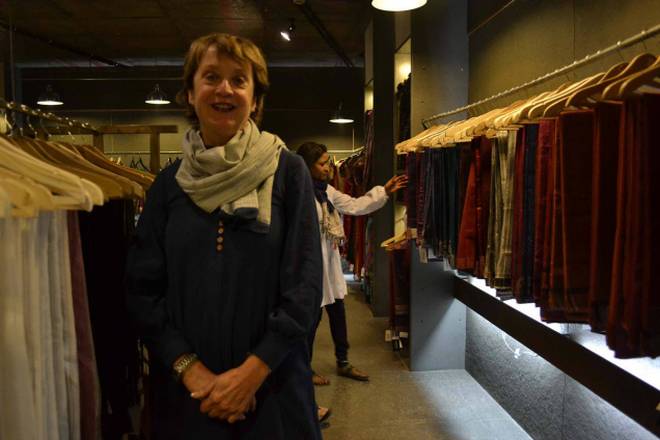India has been famous for its traditional style of weaving since many centuries. However, with the advent of technology and modern professions authentic weaving has today become a dying art. Back in the 80s, the weaving industry was in full bloom. But when India underwent industrial revolution, tens of thousands of skilled labors lost their livelihood. However, there are a few people who are working hard to keep the heritage alive.
Meet Sally Holkar, woman known for her grit and belief. She is working not just to conserve our heritage handloom industry but also to empower hundreds of women weavers by providing them employment in her charitable trust Women Weave. From studying political science in the US, to becoming a textile specialist in India, Sally’s journey has been incredible.
Newborn love for handloom
After graduating from Stanford University, US, Sally got married to Richard Holkar, son of erstwhile Holkar Maharaja of Indore, and moved to India in 1996. Back then, the original capital of Indore was Maheshwar which is known for its Maheshwari textiles. “My husband and I wanted to revive the dying tradition of handloom weaving and that’s how it all started,” recalls Sally.
“Everybody told us that we were mad to bring hand weave and nobody will buy because it was too rough of a look. I was loved to be told mad because it almost guarantees of success,” she laughs.
To do something about her love for handloom, she co-founded Rehwa society in 1978, a non-profit organization that worked with weavers. She later discontinued it but did not want to let go of her passion.
That was when Sally decided to start an organization to employ women and not just traditional weavers. So, in 2003, she founded Women Weave, a charitable trust which focuses upon the use of local grown cotton & preserving the local art of Maheshwar weaving.
Changing lives of hundreds of women
Women Weave provides employment for women in rural India mostly who are illiterate & are only bread earners of their family. It promises of exquisite product, women empowerment, poverty alleviation, and sustainability.
“The women we work with, the spinners and not the weavers, most of them have birth defects like foot deformation. This process (spinning the cotton) only requires strength in arms, so it provides a lot of employment opportunities,” says Sally.
Most of the women they work with are illiterate. Some of them are married off at an early age, have children, and are victims of domestic violence and mental abuse by their husbands. Such women seek for work to sustain their families and provide a better life for their children.
Sally came up with The Handloom School which gives these women a place to work under a shade, close to their home. They meet each other, share their problems, and are also financially independent.
“They enjoy so much together that many of them say Humko ghar nahi jana hai, aur kaam dedo (We don’t want to go home, give us more work),” she shares.
Women weave also helps them in learning how to operate laptops and in marketing of their clothes through social media.
Keeping the heritage alive
Sally is working for the the survival of heritage textile, the traditional handloom of India. 80 percent of people involved in handloom are women. She is concerned about the dying art of Indian traditional weaving.
“This is treasure, which is not viewed as a treasure, its losing its life,” she says.
Fashion changes constantly. One day it’s about texture of clothes and on another, it can be about embroidery. Women Weave ensures that they fulfil the changing demand of fashion industry. They are also focus on enhancing the creativity of women weavers to compete with power loom industry.

Women Weave has its core group of weavers in Maheshwar and Dindori near Kanha National Park. Through other NGOs, they also help kota weavers in Rajasthan, chanderi weavers in Maharashtra, and weavers in Kumaon.
Sally also runs a handloom school for young weavers which is located in Maheshwar in Madhya Pradesh. The school provides non-traditional education for students who possess traditional weaving skills but no access to a conventional academic education. It also provides work-study curriculum in textile technology.
If you like this initiative, share this story. Tell us your views in the comment box below. We read each one of them.
Looking For Startup Consultants ?
Call Pursho @ 0731-6725516
Telegram Group One Must Follow :
For Startups: https://t.me/daily_business_reads




